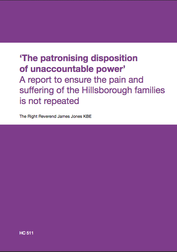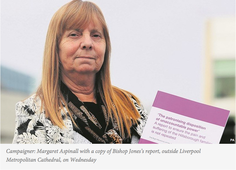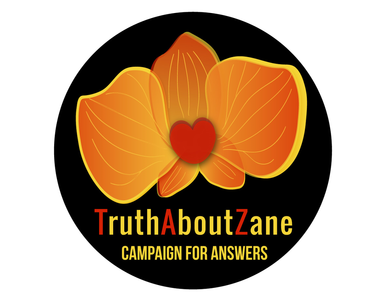
Titled The Patronising Disposition of Unaccountable Power, the report looked at the families’ 27-year ordeal – between the 1989 disaster and the end of the inquests in April 2016. It puts further pressure on the government to make sure future victims and their loved ones don’t have to endure years of lies and misinformation. The report paints a shocking picture of how families were treated by the authorities, police and media. It states the Hillsbourogh families were 'dehumanised'.
The report said the first inquests failed to accurately establish how the 96 came about their deaths, and families were unable to successfully challenge their "flawed basis" because their legal representation was inadequate.
In the report, Bishop Jones praised the "bravery and tenacity" of the Hillsborough families'.
The Hillsborough families know that there are others who have found that when in all innocence and with a good conscience they have asked questions of those in authority on behalf of those they love, the institution has closed ranks, refused to disclose information, used public money to defend its interests and acted in a way that was both intimidating and oppressive. | "But the fact that this level of resolve and persistence was necessary demonstrates a systemic failure of the processes that should work to bring about accountability and justice," he said. He called for a change to procedures, as well as an end to authorities "spending limitless sums" on representation. The reforms he sketches out in the 122-page report would benefit not only the Hillsborough families, but many others who have also experienced a dismissive, uncaring, and defensive attitude when trying to challenge public authorities, Bishop Jones argues. |
The report by Rt Rev James Jones, who chaired the independent panel – which uncovered evidence that led to new inquests, calls for a change of corporate culture away from cover-ups, a duty of candour and parity of funding for families at Inquests.
The report makes 25 recommendations including:
- A ‘Charter for Families Bereaved through Public Tragedy’ in which public bodies would commit to placing the public interest above their reputation and approach forms of public scrutiny such as inquiries and inquests with candour.
- ‘Proper participation’ of bereaved families at inquests, including non-means tested, publicly-funded legal representation for bereaved families at inquests at which public bodies are represented; the cost of which would be borne by the government departments whose agencies are frequently represented at inquests.
- Proportionate legal funding of public bodies meaning public bodies are not able to use public money to fund legal representation more advantageous than that which is available to families.
- Cultural change at inquests which would ensure the process is not adversarial, but inquisitorial as intended, upheld by relevant Secretaries of State who should make clear how public bodies should approach inquests.
- Bereaved families put at the heart of inquests, through training of coroners that includes bereaved families, and renewed guidance from the Chief Coroner.
- We were very grateful to meet with the bishop at the Home Office in order to contribute to the review of the Hillsborough families' experiences.
Rt Rev James Jones has contacted us to say that he was very struck by what he was told and has personally put our comments about Zane's inquest to the Secretary of State for Justice for further investigation. As this was important to explain this in the report the following specific reference reads as follows:
2.73 From the listening day and from conversations with other families I have gathered accounts of their recent experience of inquests. I have considered publishing their accounts in this report but have decided that their experience calls for further investigation beyond my terms of reference. I have therefore ensured personally that this material is available to the Secretary of State for Justice and to the Prime Minister and Home Secretary.
The experiences which have been described to me are persuasive that the points of learning identified in my report reflect current practice and should not be seen as limited to the historic circumstances of Hillsborough.

Hillsborough campaigner Margaret Aspinall, whose son James died in the disaster, told BBC News she was "very, very pleased" with the report.
She added: "No family deserves to go through [what we went through]. It was torture, it is still torture really. It is important the lessons are learned."
We have been very supportive of the need for the Hillsborough Law and are ever closer to getting the Hillsborough Law enacted.
We are very pleased indeed that the Bishop's Report (see details below) recommended that the Hillsborough Law is brought into force but our work is far from over. We need your help to make sure that this recommendation is not kicked into the long grass and that it is brought in as soon as possible. You can show your support here on the official website of the 'Hillsborough Law' Public Authorities Accountability Bill.
Whatever the Hillsborough families achieve will therefore be of “value to the whole nation”.
The families have not got over their grief, and never will, Bishop Jones writes. But he hopes that his report, and the changes that it recommends, will be another milestone on their “journey without a destination”.



 RSS Feed
RSS Feed